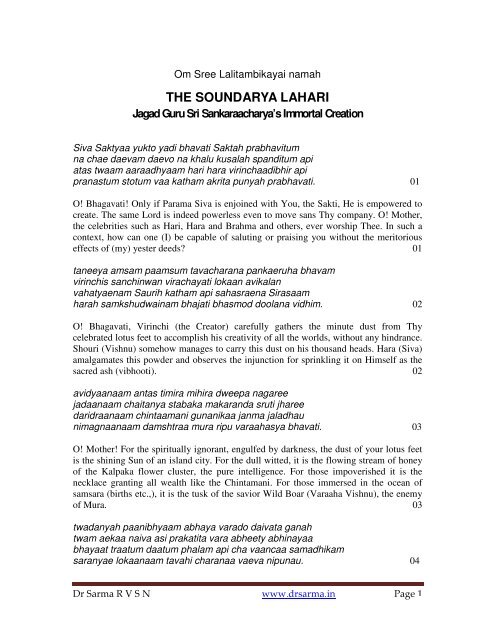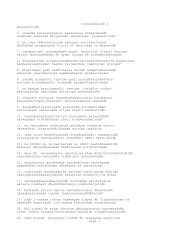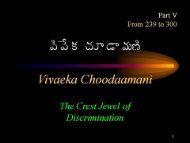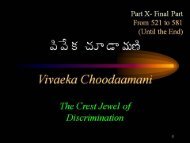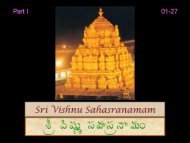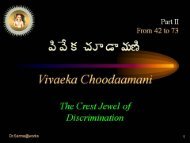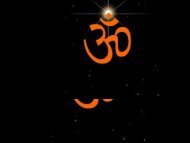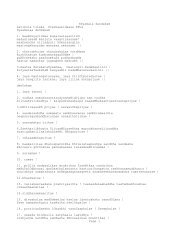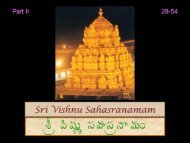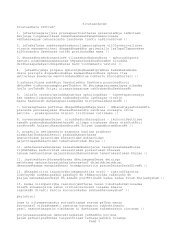Soundarya Lahari English.pdf - drsarma.in
Soundarya Lahari English.pdf - drsarma.in
Soundarya Lahari English.pdf - drsarma.in
- No tags were found...
You also want an ePaper? Increase the reach of your titles
YUMPU automatically turns print PDFs into web optimized ePapers that Google loves.
Om Sree Lalitambikayai namah<br />
THE SOUNDARYA LAHARI<br />
Jagad Guru Sri Sankaraacharya’s Immortal Creation<br />
Siva Saktyaa yukto yadi bhavati Saktah prabhavitum<br />
na chae daevam daevo na khalu kusalah spanditum api<br />
atas twaam aaraadhyaam hari hara vir<strong>in</strong>chaadibhir api<br />
pranastum stotum vaa katham akrita punyah prabhavati. 01<br />
O! Bhagavati! Only if Parama Siva is enjo<strong>in</strong>ed with You, the Sakti, He is empowered to<br />
create. The same Lord is <strong>in</strong>deed powerless even to move sans Thy company. O! Mother,<br />
the celebrities such as Hari, Hara and Brahma and others, ever worship Thee. In such a<br />
context, how can one (I) be capable of salut<strong>in</strong>g or prais<strong>in</strong>g you without the meritorious<br />
effects of (my) yester deeds 01<br />
taneeya amsam paamsum tavacharana pankaeruha bhavam<br />
vir<strong>in</strong>chis sanch<strong>in</strong>wan virachayati lokaan avikalan<br />
vahatyaenam Saurih katham api sahasraena Sirasaam<br />
harah samkshudwa<strong>in</strong>am bhajati bhasmod doolana vidhim. 02<br />
O! Bhagavati, Vir<strong>in</strong>chi (the Creator) carefully gathers the m<strong>in</strong>ute dust from Thy<br />
celebrated lotus feet to accomplish his creativity of all the worlds, without any h<strong>in</strong>drance.<br />
Shouri (Vishnu) somehow manages to carry this dust on his thousand heads. Hara (Siva)<br />
amalgamates this powder and observes the <strong>in</strong>junction for spr<strong>in</strong>kl<strong>in</strong>g it on Himself as the<br />
sacred ash (vibhooti). 02<br />
avidyaanaam antas timira mihira dweepa nagaree<br />
jadaanaam chaitanya stabaka makaranda sruti jharee<br />
daridraanaam ch<strong>in</strong>taamani gunanikaa janma jaladhau<br />
nimagnaanaam damshtraa mura ripu varaahasya bhavati. 03<br />
O! Mother! For the spiritually ignorant, engulfed by darkness, the dust of your lotus feet<br />
is the sh<strong>in</strong><strong>in</strong>g Sun of an island city. For the dull witted, it is the flow<strong>in</strong>g stream of honey<br />
of the Kalpaka flower cluster, the pure <strong>in</strong>telligence. For those impoverished it is the<br />
necklace grant<strong>in</strong>g all wealth like the Ch<strong>in</strong>tamani. For those immersed <strong>in</strong> the ocean of<br />
samsara (births etc.,), it is the tusk of the savior Wild Boar (Varaaha Vishnu), the enemy<br />
of Mura. 03<br />
twadanyah paanibhyaam abhaya varado daivata ganah<br />
twam aekaa naiva asi prakatita vara abheety abh<strong>in</strong>ayaa<br />
bhayaat traatum daatum phalam api cha vaancaa samadhikam<br />
saranyae lokaanaam tavahi charanaa vaeva nipunau. 04<br />
› Š›–Š ›œŠ›–Š ’— ŠŽ
Other than you, the assemblages of gods assure protection from fear and gesticulate this<br />
by the Abhaya mudra (hand gesture). You alone do not display such gesture with your<br />
hand of bestow<strong>in</strong>g boon and protection from fear. Oh! Mother, the refuge for the worlds!<br />
Indeed, your expert feet (you are ready to walk up to us) are good enough <strong>in</strong> offer<strong>in</strong>g<br />
such protection and giv<strong>in</strong>g bountiful rewards much <strong>in</strong> excess than our desires. 04<br />
hari stwaam aaraadhya pranata jana soubhaagya jananeem<br />
puraa naaree bhootwaa pura ripum api kshobha manayat;<br />
smaropi twaam satwaa rati nayana laehyaena vapushaa<br />
muneenaam apy antah prabhavati hi mohaaya mahataam. 05<br />
O! Mother, the very cause of auspiciousness to people who worship You, Once Sri Hari<br />
hav<strong>in</strong>g worshipped you, has become an astonish<strong>in</strong>gly beautiful woman and agitated the<br />
m<strong>in</strong>d of even Lord Siva and stole his pride. Hav<strong>in</strong>g bowed to you, Smara (cupid) too is<br />
blessed with an eternally handsome appearance which is like a soothen<strong>in</strong>g l<strong>in</strong>iment to the<br />
eyes of his consort, Rati. With this appearance, he has <strong>in</strong>deed generated delusion with<strong>in</strong><br />
hearts of even great sages. 05<br />
dhanuh poushpam mourwee madhu karamayee pancha visikhaah<br />
vasantas saamanto malaya marud aayodhana rathah<br />
tathaa apy aekas sarwam hima giri sutae kaamapi kripaam<br />
apaangaat tae labdhwaa jagad idam anango vijayatae. 06<br />
O! Daughter of the snow mounta<strong>in</strong>! What to say about your bless<strong>in</strong>gs! Manmadha’s bow<br />
is sugarcane twig. Its str<strong>in</strong>g is made of bee l<strong>in</strong>e. His five arrows are flowers. Vasanta<br />
(spr<strong>in</strong>g season) is his pal and companion. Gentle (Malaya) mounta<strong>in</strong> breeze is his chariot<br />
to wage his war. Thus, though all his <strong>in</strong>struments and associates are so <strong>in</strong>efficient,<br />
Ananga (Manmadha) triumphs over this entire world. Isn’t because of the compassionate<br />
glance from the corner of your eye 06<br />
kwanat kaanchee daamaa kari kalabha kumbha stana nataa<br />
pariksheenaa madhyae par<strong>in</strong>ata sarat chandra vadanaa<br />
dhanur bhaanaan paasam srunim api dadhaanaa karatalaih<br />
purastaa daastaam nah puramathitu raaho purushikaa. 07<br />
Let the Div<strong>in</strong>e Mother dwell <strong>in</strong>timately <strong>in</strong> our hearts …with her t<strong>in</strong>kl<strong>in</strong>g fillet girdle, Her<br />
full bosom - ak<strong>in</strong> to the frontal globes of a young elephant - mak<strong>in</strong>g her bend forward<br />
(reach<strong>in</strong>g us), Her lean waist enhanc<strong>in</strong>g her beauty, Her face ak<strong>in</strong> to the full autumnal<br />
moon. She sports <strong>in</strong> her palms a bow and arrow, a noose and a goad. I revere this Div<strong>in</strong>e<br />
Mother who is the ‘I’ consciousness <strong>in</strong> the Lord, Parama Siva. 07<br />
sudhaa s<strong>in</strong>dhor madhyae sura vitapi vaatee parivritae<br />
mani dweepae neepopa vanavati ch<strong>in</strong>taamani grihae<br />
Sivaakaarae manchae parama Siva paryanka nilayaam<br />
bhajanti twaam dhanyaah katich<strong>in</strong>a chidaananda lahareem. 08<br />
› Š›–Š ›œŠ›–Š ’— ŠŽ
Only a few evolved souls are blessed to worship you Devi! O! the unend<strong>in</strong>g flood of<br />
Eternal Bliss Absolute, You and Lord Siva shar<strong>in</strong>g a same bed, with Siva himself as your<br />
rest<strong>in</strong>g couch which is of the shape of a triangle (the Sakti triangle), <strong>in</strong> a house decorated<br />
with several Ch<strong>in</strong>tamanis, possessed <strong>in</strong> the garden of Kadamba (kalpaka) trees, <strong>in</strong> the<br />
vic<strong>in</strong>ity of a park of celestial trees, <strong>in</strong> the midst of an island <strong>in</strong> the ocean of amrita<br />
(ambrosia). 08<br />
maheem moola adhaarae kamapi manipoorae hutaavaham<br />
sthitam swaadhishthaanae hridi marutam aakaasam upari<br />
mano api bhroomadhyae sakalamapi bhittwaa kulapatham<br />
sahasraarae padmae naha rahasi patyaa viharasae . 09<br />
May I understand Thee! You are The Earth element <strong>in</strong> the Mula Adhara, The Water<br />
element <strong>in</strong> the Manipoora, The Fire element present <strong>in</strong> the Svadhishthana (<strong>in</strong>ner core of<br />
conciousness), The Air element <strong>in</strong> the heart, (go<strong>in</strong>g) above the Space element, and Thy<br />
m<strong>in</strong>d element between Thy brows (Thy immanent vision). Thus hav<strong>in</strong>g passed through<br />
all the Pancha (five) Bhootas (Gross Elements) and exhaust<strong>in</strong>g them <strong>in</strong> Thy path<br />
(Kulapatha), You sport your creative activity <strong>in</strong> secret with your husband <strong>in</strong> the thousand<br />
petalled lotus. 09<br />
sudhaa dhaaraa saarais charana yugalaantar wigalitaih<br />
prapancham s<strong>in</strong>chantee punar api rasaamnaaya mahanah,<br />
avaapya swaam bhoomim bhujaga nibhamadyushtha valayam<br />
swam aatmaanam kritwaa swapishi kulakundae kuhar<strong>in</strong>i. 10<br />
O! Mother! You <strong>in</strong>fuse the whole universe with Amrita, drench<strong>in</strong>g it <strong>in</strong> this torrential<br />
stream (Amruta dhaara), which trickls from with<strong>in</strong> your pair of feet. Once aga<strong>in</strong>, this<br />
flow reaches your territory, after drench<strong>in</strong>g the Moon - who is apparent essence of<br />
Amrita. You pervade the Earth element <strong>in</strong> the form of Kundal<strong>in</strong>i Sakti (Kula Kunda) by<br />
mak<strong>in</strong>g yourself <strong>in</strong>to three and a half coils similar to a serpent, sleep<strong>in</strong>g <strong>in</strong> it as<br />
exceed<strong>in</strong>gly subtle consciousness. 10<br />
chaturbis Sreekanthais Siva yuvatibhih panchabhir api<br />
prabh<strong>in</strong>na abhis Sambor navabhir api moola prakritibhih<br />
chatus chatwaarimsad vasu dala kalaasra trivalaya<br />
tri raekhaabhis saartham tava Sarana konaah par<strong>in</strong>ataah. 11<br />
The Sri Chakra (the abode of the Sakti) has 44 angles with four Sri Kantha (Siva chakras)<br />
and five Siva Yuvati (Other Sakti chakras), separate from the Siva chakras and these are<br />
n<strong>in</strong>e source materials for the universe. These are surrounded by the eight petalled lotus<br />
(Asta dala padma), next by the sixteen petalled lotus. All these are <strong>in</strong> three circles<br />
separated by the 3 l<strong>in</strong>es. (Sree Sakti is the 1000 petalled lotus <strong>in</strong> the bra<strong>in</strong>.) 11<br />
› Š›–Š ›œŠ›–Š ’— ŠŽ
twadeeyam soundaryam tuh<strong>in</strong>a giri kanyae tulayitum<br />
kaveendraah kalpantae kathamapi vir<strong>in</strong>chi prabhritayah<br />
yuda alokoutsukyaad amara lalanaa yaanti manasaa<br />
tapobhir dushpraapaam api girisa saayujya padaveem . 12<br />
O! Daughter of the snow mounta<strong>in</strong>! The best of poets such as Vir<strong>in</strong>chi (Brahma) and<br />
others are unable to compare, at least somehow or other, your beauty (with any th<strong>in</strong>g they<br />
know of). Out of their ardent curiosity to witness your glory, the celestial women (apsaras)<br />
enter the Lord Siva’ s m<strong>in</strong>d through contemplation and total surrender. O! This experience<br />
is impossible even by any rigorous penance. 12<br />
naram varsheeyaamsam nayana virasam narmasu jadam<br />
tavaapaanga alokae patitam anudha avanti satasah<br />
galad vaenee bandhaah kucha kalasa visrasta sichayaah<br />
hathat trutyat kaanchyo vigalita dukoolaa yuvatayah. 13<br />
O! Mother, A t<strong>in</strong>y glance from even the corner of your eye is good enough! A man, even<br />
though is very old, very ugly look<strong>in</strong>g and apathetic <strong>in</strong> amorous sport, hundreds of young<br />
women go after him, unm<strong>in</strong>dful of their loosened braided hair, slipp<strong>in</strong>g upper cloth from<br />
their attractive bosoms, suddenly snapp<strong>in</strong>g waist ornaments and their droop<strong>in</strong>g silk sarees.<br />
Isn’ t it the power of thy bless<strong>in</strong>g 13<br />
kshitou shat panchaasad dwi samadhika panchaasad udakae<br />
hutaasae dwaashashtis chamaradhika panchaasad anilae<br />
divi dwishshat trimsan manasi cha chatu shshashtir iti yae<br />
mayookhaas taeshaam apy upari tava paada ambuja yugam . 14<br />
O! Mother! Your pair of lotus feet is even above the follow<strong>in</strong>g beams of light that are<br />
thus disposed. They are fifty six <strong>in</strong> the earth element, fifty two <strong>in</strong> the water element, sixty<br />
two <strong>in</strong> the fire element, fifty four <strong>in</strong> the air element, twice thirty six (72) <strong>in</strong> the space<br />
element, and sixty four <strong>in</strong> the m<strong>in</strong>d element. Sakti staanam is above these six planes <strong>in</strong><br />
the 1000 petalled lotus <strong>in</strong> the Amruta Ocean and is called the BINDU STANAM. 14<br />
Sarajjyotsnaa suddaam sasiyuta jataa joota makutaam<br />
vara traasa traana spatika ghatikaa pustaka karaam<br />
sakr<strong>in</strong> natwaa na twaa katham iva sataam sannidadhatae<br />
madhu ksheera draakshaa madhurima dhureenaah phanitayah. 15<br />
O! Mother, You are pure like the autumnal moonlight, You are decorated with a tiara<br />
(kireeta like) made up of the mass of your twisted hair crowned with the moon, and Your<br />
hands grant all boons and promise protection from fear, and sport the crystal beads and a<br />
book of knowledge. It is, but natural that the poetic works of people, who bowed to you<br />
and got your bless<strong>in</strong>gs, are fully charged with the sweetness of honey, milk and grape<br />
juice. 15<br />
› Š›–Š ›œŠ›–Š ’— ŠŽ
kaveendraanaam chaetah kamalavana baalaat ava ruchim<br />
bhajantae yaesa sah katichid arunaam aeva bhavateem<br />
vir<strong>in</strong>chi praeyasyaas taruna tara sr<strong>in</strong>gaara laharee<br />
gabheera abhir waagbir vidadhati sataam ranjanamamee. 16<br />
O! Mother, Just as the morn<strong>in</strong>g Sun sh<strong>in</strong>e is to the lotuses, You are the illum<strong>in</strong>at<strong>in</strong>g<br />
morn<strong>in</strong>g twilight of the red dawn, to lotus hearts of the best of poets (their creativity).<br />
Those blessed good men who worship Thee, become dearest to Goddess Saraswati. By<br />
her grace, they ever impart pleasure and consummation to the hearts of like m<strong>in</strong>ded<br />
courtiers with their creative, profound and romantic poetry. 16<br />
saavitreebhir vaachaam sasimani silaabhanga ruchibhih<br />
vas<strong>in</strong>yaadya abhistwaam saha janani sanch<strong>in</strong>tayati yah<br />
sa kartaa kaavyaanaam bhavati mahataam bhangi ruchibhih<br />
vachobhir vaag daevee vadana kamala amoda madhuraih. 17<br />
O! Mother! You are <strong>in</strong> the company of Vas<strong>in</strong>i (Lakshmi), the Goddess of speech (Savitri)<br />
and the Goddess of beauty (Rati) with the luster of the moon-stone slabs (marble blocks).<br />
The one, who, adores You <strong>in</strong> the company of the above powers, certa<strong>in</strong>, he becomes the<br />
author of extra-ord<strong>in</strong>ary poetry with the beauty, taste and wit of all time great poets and<br />
his works emanate the sweet fragrance of the lotus face of the goddess Saraswati. 17<br />
tanu chchaaya abhistae taruna tarani sree saranibhih<br />
divam sarwaam urveem arunimani magnaam smarati yah<br />
bhavant asya trasyad vana har<strong>in</strong>a saaleena nayanaah<br />
sah orwasyaa vasyaah kati kati na geerwaana ganikaah. 18<br />
O! Mother! He, who understands that all heaven and earth are ever immersed <strong>in</strong> the p<strong>in</strong>k<br />
luster of Thy persona, ak<strong>in</strong> to the luster of the freshly arisen Sun, to him, how many<br />
celestial courtesan maids along with Urvasi are not at his feet - with their eyes resembl<strong>in</strong>g<br />
frightened forest deer (Indeed all such women are after him) 18<br />
mukham b<strong>in</strong>dum kritwaa kucha yuga madhastasya tadadho<br />
hara artham dhyaayaedyo hara mahishi tae manmatha kalaam<br />
sasadyas samkshobham na yati vanitaa ityati laghu<br />
trilokeem apy aasu bhramayati ravi <strong>in</strong>du stana yugaam. 19<br />
O! Queen of Hara! He, who meditates on Thee as manifestation of the Creative Force,<br />
hav<strong>in</strong>g imag<strong>in</strong>ed the B<strong>in</strong>du as Thy face, Thy bosom as the middle part, and Thy female<br />
organs of generation below that (signify<strong>in</strong>g you as force of the laya, sthiti and srusti), he<br />
immediately reduces all women <strong>in</strong>to a state of agitation very easily. He even deludes<br />
quickly, the maiden named Trilokee (three worlds) who has the sun and moon as her pair<br />
of breasts. 19<br />
› Š›–Š ›œŠ›–Š ’— ŠŽ
kiranteem angaebhyah kirana nikurumba amrita rasam<br />
hridi twaam aadhattae hima kara silaa moortim iva yah<br />
sa sarpaanaam darpam samayati sakuntaadhipa iva<br />
jwara plushtaan drishtyaa sukha yati sudhaa dhaara sirayaa. 20<br />
O! Mother! He, who fixes Thee <strong>in</strong> his heart as the sc<strong>in</strong>tillation emanat<strong>in</strong>g, like nectar,<br />
from the various parts of Thy persona, like the multitude of cool rays from an idol made<br />
up of moon-stone (marble), becomes powerful like Garutman, the lord of birds – who<br />
destroys the pride of serpents. Such a devoted man comforts those scorched by fever by<br />
his mere look, endowed as if he is with the vessel overflow<strong>in</strong>g with Amrita. 20<br />
tatil laekhaa tanweem tapana sasi vaiswaanaramayeem<br />
nishannaam shannaam apy upari kamalaanaam tava kalaam<br />
mahaa padma atavyaam mridi tamalamaayaena manasaa<br />
mahaantah pasyanto dadhati parama ahlaada lahareem. 21<br />
O! Mother, Thy form is fasc<strong>in</strong>at<strong>in</strong>g like a streak of lightn<strong>in</strong>g, and with the glory of the<br />
Sun, Moon and Fire. Great evolved souls perceive and contemplate Thee <strong>in</strong> their m<strong>in</strong>ds,<br />
with esteem as the Sadakhya kala or B<strong>in</strong>du Roopam seated <strong>in</strong> the great lotus forest (the<br />
sahasrara), above the six yogic chakras and thus they possess unend<strong>in</strong>g supreme joy. 21<br />
bhavaani tavam daasae mayi vitara drushtim sakarunaam<br />
iti stotum vaanchan kathayati bhavaani twam itiyah<br />
tadaiva twam tasmai disasi nija saayujya padaveem<br />
mukunda brahmaendra sphuta makuta neeraajita padaam. 22<br />
O! Bhavani! The very moment one surrenders to you say<strong>in</strong>g – “I am your slave, bestow<br />
Thy compassionate look on me”, You grant him, before he completes that sentence, the<br />
perpetual state of absorption <strong>in</strong> Thee at Thy feet. Aren’ t your feet glitter<strong>in</strong>g with the<br />
tw<strong>in</strong>kles from the precious stones <strong>in</strong> the bright diadems (kireetas) of Mukunda, Brahma,<br />
and Indra 22<br />
twayaa hritwaa vaamam vapu ripari truptaena manasaa<br />
sareera artham sambhor aparam api sanko hritam abhoot<br />
yadaetat twad roopam sakalam arunaabhan tr<strong>in</strong>ayanam<br />
kuchaabhyaam aanamram kutila sasi choodaala makutam. 23<br />
O! Mother! I imag<strong>in</strong>e, you might have taken over the right half too of the persona of the<br />
Lord Siva, perhaps be<strong>in</strong>g discontented to be only <strong>in</strong> his left half. That must be the reason<br />
for your entirely red, sc<strong>in</strong>tillat<strong>in</strong>g appearance with the three eyes, shaped bosom and<br />
curved body and the crown crested by the moon crescent. 23<br />
jagat sootae dhaataa harir avati rudrah kshapayatae<br />
tiraskurwann aetat swam api vapureesa stirayati<br />
sadaa poorwas sarwam tad ida manugrihnaati cha sivah<br />
tava ajnaam aalambya kshana chalitayor bhroo latikayoh. 24<br />
› Š›–Š ›œŠ›–Š ’— ŠŽ
O! Mother! Dhata (Brahma) begets the world. Hari protects it. Rudra destroys it. Eswara<br />
withdraws them (Dhata, Hari and Rudra), at will <strong>in</strong>to Him and obscures even his own<br />
body (by merg<strong>in</strong>g <strong>in</strong>to Sadasiva). Indeed Siva (whose name) is preceded by (the word)<br />
Sada, obliges <strong>in</strong> all this, based upon Thy order, granted to Him by the momentary<br />
movement of your eye-brows. 24<br />
trayaanaam daevaanaam triguna janitaanaam tava sivae<br />
bhavaet poojaa poojaa tava charanayor yaa virachitaa<br />
tathaahi twaat paadod wahana mani peethasya nikatae<br />
sthitaahy aetae saswan mukulita karottam samakutaah. 25<br />
O! Sivaani! That homage made to Thy feet is verily the homage made to the Tr<strong>in</strong>ity<br />
(three gods) born of Thy three powers or Gunas. This is <strong>in</strong>deed true and appropriate, for,<br />
the Tr<strong>in</strong>ity, with their folded hands held together on their fore- heads, always adore Thee<br />
with their crowns touch<strong>in</strong>g the gem studded foot rest of yours. 25<br />
vir<strong>in</strong>cih panchatwam vrajati harir aapnoti viratim<br />
v<strong>in</strong>aasam keenaaso bhajati dhanado yaati nidhanam<br />
vitandree maahaendree vitatir api sammeelita drisaa<br />
mahaa samhaarae asm<strong>in</strong> viharati sati twat patir asou. 26<br />
O! Mother! Vir<strong>in</strong>chi embraces death. Hari becomes <strong>in</strong>active. K<strong>in</strong>aasa (Yama) tastes<br />
destruction. Dhanada (Kubera) proceeds to death. The group of Indras (14 Manus and 14<br />
Indras) is also <strong>in</strong> deep sleep (death) with eyes closed. Oh Sati! In this great universal<br />
destruction, Thy husband (Sadasiva) cont<strong>in</strong>ues to sport (<strong>in</strong> Thy company). 26<br />
japo jalpas silpam sakalam api mudraa virachanaa<br />
gatih praadaksh<strong>in</strong>ya kramanam asanaadya ahuti vidhih<br />
pranaamas samvaesas sukham akhilam aatmaarpana drisaa<br />
saparyaa paryaayas tava bhavatu yan mae vilasitam. 27<br />
O! Mother! Let my speech be Thy prayers, and all manual tasks I do, be the symbolic<br />
arrangement of f<strong>in</strong>gers <strong>in</strong> Thy worship, let my gait be the steps of circumambulation of<br />
Thee, let my food etc. be the oblations offered to Thee, let my silence <strong>in</strong> sleep be Thy<br />
salutation, let all that is happily manifested <strong>in</strong> me be synonymous with Thy worship -<br />
from the po<strong>in</strong>t of view of offer<strong>in</strong>g myself (<strong>in</strong> your worship). 27<br />
sudhaam apy aaswaadya pratibhaya jaraa mrityu har<strong>in</strong>eem<br />
vipadyantae viswae vidhi sata makha mukhaadyaa divishadah<br />
karaalam yat kshwaelam kabalitavatah kaala kalanaa<br />
na sambhos tanmoolam tava janani taatanka mahimaa. 28<br />
O! Mother! The Brahma, Indra and other celebrities of the heaven, though they have<br />
taken the immortal fluid, Amrita, which is supposed to remove the fearful old age (and)<br />
death, perish at the time of Pralaya (total dissolution). But, Sambhu, though he consumed<br />
the dreadful poison (Kala koota visham) is not affected even the least by the all<br />
devour<strong>in</strong>g Time. Isn’ t it because of the greatness of your earr<strong>in</strong>gs! 28<br />
› Š›–Š ›œŠ›–Š ’— ŠŽ
kireetam vair<strong>in</strong>cham parihara purah kaitabha bhidah<br />
kathorae koteerae skhalasi jahi jambhaari makutam<br />
pranamraeshwae taeshu prasabham upayaa tasya bhavanam<br />
bhavasya abhyutthaanae tava parijanoktir wijayatae. 29<br />
O! Mother! “Watch out, there is the crown of Brahma near your feet. Be careful <strong>in</strong> front!<br />
You may trip on the hard crown of Vishnu (Kaitabhabhida)! Carefully avoid the crown of<br />
Indra (Jambhari)!” - May such cautionary words of your ret<strong>in</strong>ue triumph, when you<br />
impetuously (suddenly <strong>in</strong> haste) rise <strong>in</strong> honour of Bhava (Your Lord Siva), who<br />
approaches your palace, when these gods are pay<strong>in</strong>g their obeisance to You. 29<br />
swadaehod bootaabhir ghranibhir animaadwaabhir abhitah<br />
nishaevyae nityae twaam aham iti sadaa bhaavayati yah<br />
kim aascharyam tasya tr<strong>in</strong>ayana samriddim trunayatah<br />
mahaa samvarta agnir wirachayati neeraajana vidhim. 30<br />
O! What a wonder! O Mother! Worthy of all adoration! Oh the Eternal One! He who<br />
constantly meditates on Thee, as the manifestation of the Anima etc., eight siddhis<br />
generated from Thy own body, and contemplates on You, merg<strong>in</strong>g himself with Thee, -<br />
He (such a devotee) considers the wealth of absorption <strong>in</strong>to Siva as equivalent, but, to a<br />
piece of straw. To him the great fire of dissolution by You will appear as the Harati<br />
(neerajanam or the ceremony of wav<strong>in</strong>g lights <strong>in</strong> worship). 30<br />
chatushshashtyaa tantraih sakalam atisandhaaya bhuvanam<br />
sthitas tat tat siddhi prasava para tantraih pasupatih<br />
punastwan nirbandhaad akhila purusha arthaika ghatanaa<br />
swatantram tae tantram kshiti talam avaateetarad idam. 31<br />
O! Mother! Pasupati has <strong>in</strong>troduced <strong>in</strong>to the world the sixty four (Maha maaya, Sambarya<br />
etc.,) spiritual discipl<strong>in</strong>es (tantras), which are capable generat<strong>in</strong>g any desired result, each<br />
one giv<strong>in</strong>g a restricted fruit of its power. But, orda<strong>in</strong>ed by You, he caused this, Your<br />
spiritual discipl<strong>in</strong>e called Sri Vidya, which alone <strong>in</strong>dependently br<strong>in</strong>gs together as one, all<br />
the purushardhas or pr<strong>in</strong>cipal fulfillments of human life, to descend on to the earth. 31<br />
Sivas sakti kaamah kshiti ratha ravis seeta kiranah<br />
smaro hamsas sakras tadanucha paraa maara harayah<br />
amee hrul laekhaabhis tisrubhir avasaanaeshu ghatitaah<br />
bhajantae varna astae tava janani naama avayavataam. 32<br />
O! Mother! Siva, Sakti, Kama, Kshiti (the words stand<strong>in</strong>g for the syllables ‘ka', ‘ae', ‘ee',<br />
‘la'), then Ravi, Seetakirana, Smara, Hamsa, Sakra (the words stand<strong>in</strong>g for the syllables<br />
`ha', `sa', `ka', `ha', `la'), and follow<strong>in</strong>g that Paraa, Maara, Hara (the words stand<strong>in</strong>g for<br />
the syllables `sa', `ka',`la') – they form your mantram. Oh Mother! With the three<br />
Hrimkaras (Hreem) jo<strong>in</strong>ed to the end of each these three groups your syllables, they<br />
become of your name (the fifteen syllabled mantra (panchadasa aksharee mantram). With<br />
the sixteenth secret syllable ‘Srim’ it becomes the SriVidya mantra). 32<br />
› Š›–Š ›œŠ›–Š ’— ŠŽ
smaram yonim lakshmeem tritayam idam aadou tava manoh<br />
nidhaay aikae nitya niravadhi mahaa bhoga rasikaah<br />
bhajanti twaam ch<strong>in</strong>taamani guna nibaddha aksha valayaah<br />
sivaagnou juhwantas surabhi ghruta dhaara ahuti sataih. 33<br />
O! Mother! Hav<strong>in</strong>g placed these three –Smara (Kama raja beejam), Yoni (Bhuvanaeswari<br />
beejam), Lakshmi beejam (stand<strong>in</strong>g for the syllables ‘Iyam’ , ‘Hrim and ‘Srim’ ') <strong>in</strong> the<br />
beg<strong>in</strong>n<strong>in</strong>g of Your mantra, Oh Eternal one!, only a blessed few connoisseurs (tapasvis) of<br />
endless great sacrifice worship You with Aksha maala of Ch<strong>in</strong>tamani gems by pour<strong>in</strong>g<br />
oblations <strong>in</strong>to the fire of Siva, with hundreds of pots of fragrant streams of ghee (clarified<br />
butter). 33<br />
sareeram twa sambhos sasi mihira vakshoruha yugam<br />
tava atmaanaam manyae bhagavati navaatmaanam anagham<br />
atas saeshas saeshee twayam ubhaya saadhaarana tayaa<br />
sthitas sambandhovaam sama rasa paraananda parayoh. 34<br />
O! Bhagavati! You are the all pervasive eternal body of Siva, with the Sun and the Moon<br />
as Thy breasts. I consider this flawless, eternal, ever green appearance of Thee as Ananda<br />
Bhairava roopam of Th<strong>in</strong>e. Thus, this relation-ship of the nature as the accessory and you<br />
both be<strong>in</strong>g the Pr<strong>in</strong>cipal power, is common to both of you. You two are the Parananda<br />
(Bliss superlative) and Paraa (Supreme) <strong>in</strong> One equipoise. 34<br />
manas twam vyoma twam marud api marut saarathi rasi<br />
twam aapas twam bhoomis twayi par<strong>in</strong>ataayaam nahi param,<br />
twamaeva swa atmaanam par<strong>in</strong>amayitum viswa vapushaa<br />
chidaananda kaaram siva yuvati bhaavaena bibhrishae . 35<br />
O! Consort of Lord Siva! You are the m<strong>in</strong>d, You are the space, You are the air, You are<br />
the fire, You are the water (and) You are the earth. Thus, this entire created world is but,<br />
Thy transformation and there is noth<strong>in</strong>g else <strong>in</strong>deed which is not You. You, by yourself<br />
transform your own self i8 0 t Td (r)Tj 3.96 0 Td (e)Tj 5.28 0 Td (a)Tj 5. Td (4)Tj 6 0 Td ( )Tj -432 -13.8 T<br />
› Š›–Š ›œŠ›–Š ’— ŠŽ
visuddhou tae suddha sphatika visadam vyoma janakam<br />
Sivam saevae daeveem api Sivasamaana vyavasitaam<br />
yayoh kaantyaa yaantyaah sasi kirana saaroopya saranaer<br />
vidhoota antardhwaantaa vilasati chakoreeva jagatee. 37<br />
O! Bhagavati! The world is filled with bliss, once its <strong>in</strong>ner darkness (ajnaana) is dispelled<br />
by the eternal illum<strong>in</strong>ation from You both, which is ak<strong>in</strong> to the cool moon light dispell<strong>in</strong>g<br />
all darkness (on a full moon day) and mak<strong>in</strong>g merry to the Chakora birds. I serve the<br />
Lord Siva who is of crystall<strong>in</strong>e purity and who is the father of all the space - along with<br />
You, the purest of the pure, You only can be equated to Siva. 37<br />
sam unmeelat samvit kamala makarandaika rasikam<br />
bhajae hamsa dwandwam kim api mahataam maanasacharam,<br />
yad aalaapaad ashtaa dasa gunita vidyaa par<strong>in</strong>atih<br />
yad aadattae doshaad gunam akhilam adbyah paya iva. 38<br />
O! Mother! What should I say! I adore the <strong>in</strong>describable pair of Swans (Siva and Sakti),<br />
which relish only the honey from the fully bloomed lotus of Knowledge, which ever<br />
swim <strong>in</strong> the lake Manasa of the hearts of evolved be<strong>in</strong>gs, whose conversation is the<br />
essence of eighteen evolved systems of knowledge and which pair accepts all virtue and<br />
forgives s<strong>in</strong>, like swan tak<strong>in</strong>g milk and leav<strong>in</strong>g out water. 38<br />
tava swaadhishthaanae hutavaham adishthaaya niratam<br />
tameedae samvartam janani mahateem taancha samayaam<br />
yad aalokae lokaan dahati mahati krodha kalitae<br />
daya ardraayaa drushtih sisiram upachaaram racayati. 39<br />
O Mother! Hav<strong>in</strong>g stationed the fire element <strong>in</strong> your Swa-adhishthana chakra, I praise<br />
un<strong>in</strong>terruptedly that fire of dissolution (Siva as Rudra) and that annihilator called the<br />
Great Samayaa (Time). O! See, the very sight of Rudra (the fire) impelled by great anger<br />
of Him, burns the worlds, while that cool looks of yours filled with empathy and<br />
compassion comfort the world as a cool<strong>in</strong>g remedy. 39<br />
tatittwantam saktyaa timira paripanthi sphuranayaa<br />
spuran naanaa ratna abharana par<strong>in</strong>adhdhae <strong>in</strong>dra dhanusham<br />
tava syaamam maegham kamapi manipooraika saranam<br />
nishaenae varshantam hara mihira taptam tribhuvanam. 40<br />
O! Mother! You are stationed <strong>in</strong> Your Manipoora chakra, with the power of lighten<strong>in</strong>g to<br />
drive away the enemy called ajnaana (darkness), simulat<strong>in</strong>g a ra<strong>in</strong>bow from the<br />
variegated lustre emanat<strong>in</strong>g from the gem studded ornaments of yours. O! It is beyond<br />
comprehension! You are the dense black cloud that drenches and quenches the three<br />
worlds, scorched by the <strong>in</strong>tense heat of the Sun called Siva (Pralaya Kala Rudra). 40<br />
› Š›–Š ›œŠ›–Š ’— ŠŽ
tavaadhaarae moolae saha samayayaa laasya parayaa<br />
nava atmaanam manyae navarasa mahaa taandava natam,<br />
ubhaabhyaam aetaabhyaam udaya vidhim uddisya dayayaa<br />
sanaathaabhyaam jajnae janaka jananeemat jagad idam. 41<br />
O! Mother! In your Mulaadhara chakra, I contemplate on the Samayaa (Ananda Bhairavi),<br />
who is engrossed <strong>in</strong> the Lasya dance, along with Nava atman (Ananda Bhairava) danc<strong>in</strong>g<br />
the wonderful Siva Tandava dance filled with Nava rasas (n<strong>in</strong>e different expressions of<br />
m<strong>in</strong>d). This world is no more an orphan as it has acquired the Father and the Mother <strong>in</strong><br />
You two. You are compassionate and have creation as your objective. 41<br />
Here ends The Ananda <strong>Lahari</strong>, the first part of <strong>Soundarya</strong> <strong>Lahari</strong>, describ<strong>in</strong>g the<br />
formless (Niraakaara roopam), the Bliss Absolute, the Supreme Power, The Adi Sakti.<br />
The follow<strong>in</strong>g verses describe the Eternal Beauty of the Mother as the form for worship<br />
(Sakaara roopam). This description of the Eternal Mother is from top to toe, with<br />
peerless poetic elegance and figurative beauty which can be experienced only by the one<br />
of deep contemplation. The poet Sankara, comes with astound<strong>in</strong>g descriptions of the<br />
<strong>in</strong>describable Almighty. May we submit our heartiest obeisance to this great master!<br />
› Š›–Š ›œŠ›–Š ’— ŠŽ
gatair maanikya twam gagana manibhis saamsthra ghatitam<br />
kireetam tae haimam himagiri sutae keertiyati yah,<br />
sa needaey achchaayaach churana sabalam chandra sakalam<br />
dhanus sounaaseeram kim iti na nibadhnaati dhishanaam. 42<br />
O the daughter of the snow mounta<strong>in</strong>! O Mother! Which ever poet describes your golden<br />
crown crafted and densely packed with the twelve Suns (Dwadasa Adityas) from the 12<br />
galaxies as the gems, will he not compose <strong>in</strong> his poetry that the fragment of the moon<br />
decorated on your crown is <strong>in</strong> itself the ra<strong>in</strong>bow, reflect<strong>in</strong>g the variegated colours due to<br />
the lustre of the celestial orbs 42<br />
dhunotu dhwaantam nas tulita dalita endeevara vanam<br />
ghana snigdha slakshnam chikura nikurumbam tava sivae<br />
yadeeyam sourabhyam sahajam upalabdhum samanaso<br />
vasanty asm<strong>in</strong> manyae vala mathana vaatee vitap<strong>in</strong>aam. 43<br />
O! Sivae! Resembl<strong>in</strong>g the cluster of fully bloomed blue lotuses or the dense blue-black<br />
clouds- very soft, silky, fragrant and glossy- is your hair style. Its darkness must<br />
annihilate the darkness <strong>in</strong> our hearts. I th<strong>in</strong>k; to steal some of the natural fragrance from<br />
your hair, all the div<strong>in</strong>e flowers (parijata) <strong>in</strong> the celebrated garden of Indra, ever cherish<br />
to dwell <strong>in</strong> your hair. 43<br />
tanotu kshaemam nah tava vadana soundarya laharee<br />
pareevaaha srotas saranir iva seemanta saranih<br />
vahantee s<strong>in</strong>dhooram prabala kabaree bhaara timira<br />
dwishaam brundair bandeekrutam iva naveena arka kiranam. 44<br />
O! Mother! The mid partition l<strong>in</strong>e <strong>in</strong> your dense hair style, simulat<strong>in</strong>g a rivulet<br />
overflow<strong>in</strong>g from the ocean of your beautiful face, is decorated with the s<strong>in</strong>dhooram<br />
(vermillion powder). It is ak<strong>in</strong> to the early morn<strong>in</strong>g rays of the Sun (Arunodaya); this Sun<br />
appears, as if, captured by a group of enemies called darkness which is your dense mass<br />
of hair. Let this charm grant us all wellbe<strong>in</strong>g! 44<br />
araalais swaabhaavyaad alika labhasa sreebhir alakaih<br />
pareetam tae vaktram parihasati pankaeruha ruchim,<br />
dara smaerae yasm<strong>in</strong> dasana ruchi k<strong>in</strong>jilka ruchirae<br />
sugandhou maadyanti smara dahana chakshur madhulihah. 45<br />
O! Mother! Your lotus face is covered by your naturally curly hair and thus resembles the<br />
beauty of dark bee l<strong>in</strong>es swarm<strong>in</strong>g a lotus; Is it not ridicul<strong>in</strong>g the so called beauty of any<br />
red lotus You graceful face is further glorified by your slight smile with the glitter of<br />
Thy teeth as the glisten<strong>in</strong>g lotus filaments. O! What to say! Lord Parama Siva has<br />
annihilated Manmadha with his looks, but is <strong>in</strong>toxicated <strong>in</strong> ever rejoic<strong>in</strong>g with the beel<strong>in</strong>e<br />
of his looks <strong>in</strong> Thy fragrant lotus face. 45<br />
› Š›–Š ›œŠ›–Š ’— ŠŽ
lalaatam laavanya dyuti vimalam aabhaati tava yat<br />
dwiteeyam tan manyae makuta ghatitam chandra sakalam,<br />
viparyaasa nyaasad ubhayam api sambhooya cha mithah<br />
sudhaa laepa syootih par<strong>in</strong>amati raakaa hima karah. 46<br />
O! Mother! That forehead of Thee, sh<strong>in</strong><strong>in</strong>g with pure lustrous beauty, appears as one<br />
half-moon. Decorated on Your crown is the other half of the Moon. O! Here we have the<br />
Full Moon born, when we imag<strong>in</strong>e these two halves, placed after revers<strong>in</strong>g, and<br />
comb<strong>in</strong>ed mutually, with the seam l<strong>in</strong>e plastered by Amrita. 46<br />
bhruvou bhugnae k<strong>in</strong>chid bhuvana bhaya bhanga vyasan<strong>in</strong>i<br />
twadeeyae naetraabhyaam madhukara ruchibhyaam dhrutagunam,<br />
dhanur manyae savya etara kara griheetam rati pataeh<br />
prakoshthae mushtou cha sthaya gati nigoodha aanartam umae. 47<br />
O! Mother! Uma Devi! The one ever habituated to destroy<strong>in</strong>g all fear and misery <strong>in</strong> all<br />
the worlds! Your slightly curved eye-brows are like the bow of Manmadha (Rati pati),<br />
with your jet black beautiful eyes like the bee l<strong>in</strong>e str<strong>in</strong>g, fixed as bow str<strong>in</strong>g. This is, as<br />
if Manmadha has grasped this bow with his left hand and hence the middle part of the<br />
bow is hidden by his fist and that of the bow str<strong>in</strong>g by his fore arm. 47<br />
aha syootae savyam tava nayanam arkaatmaka tayaa<br />
tri yaamaam vaamam tae srujati rajanee naayaka tayaa,<br />
truteeyaa tae drushtir dara dalita haemaambuja ruchih<br />
sama adhattae sandhyaam divasa nisayor antara chareem. 48<br />
O! Mother! Thy right eye creates the day, be<strong>in</strong>g red and fiery, of the nature of the Sun<br />
and Thy left eye be<strong>in</strong>g cool, of the nature of the Moon, creates the night. O! Isn’ t<br />
beautiful! Your third eye, well, with its lustre of a slightly blossomed golden lotus,<br />
produces the twilight (sandhya), <strong>in</strong>terposed <strong>in</strong> between the day and night. 48<br />
visaalaa kalyaanee sphuta ruchir ayodhyaa kuvalayaih<br />
krupaadhaaraa aadhaaraa kim api madhuraa aabhogavatikaa,<br />
avantee srishti, stae bahu nagara vistaara vijayaa<br />
dhruvam tat tan naama vyavaharana yogyaa vijayatae. 49<br />
O! Mother! What to write! Thy affectionate looks are wide (Visala), auspicious (Kalyan),<br />
of full bloomed beauty (Kuvala), unassailable by blue water lilies (Ayodhya), the<br />
reservoir of a stream of compassion (Dhara), sweet (Madhura), long (Bhogavatika),<br />
protect<strong>in</strong>g (Avanti). They surpass the vast expanse (of this country), encompass<strong>in</strong>g many<br />
cities and deserv<strong>in</strong>g them to be named after Your compassionate glance hav<strong>in</strong>g <strong>in</strong>deed<br />
conquered them (Vijaya) all. 49<br />
kaveenaam sandarba stabaka makarand aika rasikam<br />
kataaksha vyaakshaepa bhramara kalabhou karna yugalam<br />
amunchantou drushtwaa tava navarasa aswaada taralou<br />
asooyaa samsargaad alika nayanam k<strong>in</strong>chid arunam. 50<br />
› Š›–Š ›œŠ›–Š ’— ŠŽ
O! Bhagavati! Your ears relish the honey from the flower bouquet like nectar<strong>in</strong>e poetry<br />
of the great poets. Your bee-like black eyes, ever close to Your ears (means wide eyes),<br />
are always fond of dr<strong>in</strong>k<strong>in</strong>g Nava Rasas (Sr<strong>in</strong>gara etc.) <strong>in</strong> such poetry. The third eye on<br />
your fore head (be<strong>in</strong>g not <strong>in</strong> contact with the ears), is perhaps taken over by envy and so<br />
is slightly red <strong>in</strong> colour. 50<br />
sivae srigaara ardraa tad itara janae kutsana paraa<br />
saroshaa gangaayaam girisa charitae vismayavatee,<br />
hara ahibhyo bheetaa sarasiruha soubhaagya jananee<br />
sakheeshu smaeraa tae mayi janani drishtih sa karunaa. 51<br />
O! Mother! Thy looks are the Nava rasas. They are full of love upon Siva, filled with pity<br />
and empathy towards other be<strong>in</strong>gs, exceed<strong>in</strong>gly contemptuous on enemies, filled with<br />
jealousy and anger towards Ganga, full of amazement while (hear<strong>in</strong>g about) Lord Siva’ s<br />
greatness, frightened when look<strong>in</strong>g at the serpents on Hara, beautiful while impart<strong>in</strong>g the<br />
charm to the lotuses, smil<strong>in</strong>g towards Thy friends and f<strong>in</strong>ally they are very compassionate<br />
upon me. 51<br />
gatae karna abhyarnam garuta iva pakshmaani dadhatee<br />
puraam bhaettuh chitta prasama rasa vidraavana phalae,<br />
imae naetrae gotraadhara pati kulottamsa kalikae<br />
tava akarna akrushnalu smara sara vilaasam kalayatah 52<br />
O! Bhagavati, Aren’ t You the best floral decoration of Himavat Parvata’ s family! These<br />
eyes of yours are wide enough to reach Thy ears, are further glorified by feathery<br />
(smooth and thick rows) eye lashes. It is no wonder if Your eyes have stolen the calm and<br />
quiet m<strong>in</strong>d of Lord Siva (the annihilator of Tripura asura). Stretched up to the ears they<br />
impart the graceful sharpness to the arrows of Manmadha to defeat Siva. 52<br />
vibhakta traivarnyam vyatikar ita leelaanjana tayaa<br />
vibhaati twan naetra tritayam idam eesaana dayitae,<br />
punas srashtum daevaan druh<strong>in</strong>a hari rudra anuparataan<br />
rajas satwam bibhrat tama iti gunaanaam trayam iva. 53<br />
O! Mother, the darl<strong>in</strong>g of Lord Siva! Thy three eyes decorated by beautify<strong>in</strong>g black<br />
paste on the lid marg<strong>in</strong>s show a comb<strong>in</strong>ation of three separate colours – red, white and<br />
black, as if bear<strong>in</strong>g the three Gunas namely rajas, satvam and tamas, to recreate the<br />
Brahma, Vishnu and Rudra, who have ceased to exist. 53<br />
pavitree kartum nah pasupati paraadheena hrudayae<br />
dayaa mitrair naetrair aruna dhavala syaama ruchibhih,<br />
nadah sono gangaa tapanatanaya aeti dhruvam ayam<br />
trayaanaam teerthaanaam upanayasi sambaedam anagham. 54<br />
› Š›–Š ›œŠ›–Š ’— ŠŽ
O! Mother, with your heart surrendered to Pasupati! Thy looks endowed with k<strong>in</strong>dness<br />
are gentle and pleas<strong>in</strong>g. They glorify the three colours red, white and deep blue. In these<br />
three colours, You br<strong>in</strong>g us this pure confluence of the three holy rivers - the river Sona<br />
(red/ Saraswati), the Ganga (white) and the Yamuna (deep blue) <strong>in</strong> order to purify us.<br />
This is certa<strong>in</strong>! 54<br />
nimaesho unmaeshaabhyaam pralayam udayam yaati jagatee<br />
tavaety aahus santo dharaneedhara raajanya tanayae<br />
twad unmaeshaaj jaatam jagad idam asaesha pralayatah<br />
pari traatum sanko parihrita nimaeshaas tava drisah. 55<br />
O! Mother, the daughter of the royal mounta<strong>in</strong>! Good men assert that the world proceeds<br />
to annihilation and creation on the clos<strong>in</strong>g and open<strong>in</strong>g of your eye lids. I imag<strong>in</strong>e that<br />
your eyes have abandoned clos<strong>in</strong>g the eye lids, <strong>in</strong> order to protect, from annihilation, this<br />
entire world born upon open<strong>in</strong>g of your eye lids. 55<br />
tava aparnae karnae japa nayana paisunya chakitaah<br />
nileeyantae toyae niyatam animaeshaah sapharikaah,<br />
iyam cha sreer baddachchada puta kavaatam kuvalayam<br />
jahaati pratyooshae nisi cha vighatayya pravisati. 56<br />
O Aparna! Parvati! It is certa<strong>in</strong> that the glitter<strong>in</strong>g female (safarika) fish ever hide <strong>in</strong> the<br />
water with unbl<strong>in</strong>k<strong>in</strong>g eyes, afraid of slanderous compla<strong>in</strong>ts (that the fish have stolen the<br />
unbl<strong>in</strong>k<strong>in</strong>g and glisten<strong>in</strong>g nature from your eyes) whispered <strong>in</strong> to thy ears, by your eyes.<br />
And look at this - the goddess of beauty abandons the blue water lily flowers with their<br />
petals doors closed at dawn, and enters them hav<strong>in</strong>g opened the petal doors at night (The<br />
Goddess beauty resides <strong>in</strong> the eyes of Mother dur<strong>in</strong>g day and <strong>in</strong> the lily at night). 56<br />
drusa adraagheeyasyaa dara dalita neelotpala ruchaa<br />
daveeyaam sam deenam snapaya kripayaa maam api sivae !<br />
anaena ayam dhanyo bhavati na cha tae haanir iyataa<br />
vanaevaa harmyaevaa samakara nipaato hima karah. 57<br />
O Sivae! Please bathe me, this poor and far removed devotee, with Thy compassionate,<br />
merciful and protracted look - with the beauty of a slightly blossomed blue lotus. I will be<br />
blessed with all prosperity by this look and do not loose any th<strong>in</strong>g by such a gesture.<br />
Isn’ t the moon sh<strong>in</strong><strong>in</strong>g equally <strong>in</strong> the forest as well as on the (k<strong>in</strong>gs) palace (I know you<br />
don’ t discrim<strong>in</strong>ate me.) 57<br />
araalam tae paalee yugalam agaraajanya tanayae !<br />
na kaeshaa maadhattae kusuma sara kodanda kutukam<br />
tirascheeno yatra sravana patham ullamnghya vilasan<br />
apaanga vyaasango disati sara sandaana dhishanaam. 58<br />
› Š›–Š ›œŠ›–Š ’— ŠŽ
O! The daughter of the mounta<strong>in</strong> k<strong>in</strong>g! Who will not believe vehemently that the curved<br />
temple region of yours (<strong>in</strong> front of the ears) is the bow of Manmadha - where<strong>in</strong> the<br />
attention of the corner of the eye, hav<strong>in</strong>g passed through the reach of the ears and go<strong>in</strong>g<br />
beyond, glitter<strong>in</strong>g, makes one understand it as the arrow mounted on the bow. 58<br />
sphurad gandaabhoga prati phalita taatanka yugalam<br />
chatus chakram manyae tava mukham idam manmatha ratham,<br />
yam aaruhya druhyaaty avani ratham arkaendu charanam<br />
mahaa veero maarah pramatha patayae sajjita vatae 59<br />
O! Mother! I imag<strong>in</strong>e the face of Yours with the pair of round ear ornaments reflected<br />
on Your glossy, sh<strong>in</strong><strong>in</strong>g cheeks is the four wheeled chariot of Manmadha. Hav<strong>in</strong>g<br />
embarked on it (Your face as the chariot), the great warrior Manmadha, seeks to triumph<br />
Lord Siva armed with the earth as a chariot of two wheels namely the Sun and Moon. (It<br />
is no strange if Manmadha w<strong>in</strong>s over this war with Your face as his chariot.) 59<br />
saraswatyaa sookteer amrita laharee kousala hareeh<br />
pibantyaah sarwaanee sravana chulukaabhyaam aviralam,<br />
chamatkaara slaaghaa chalita sirasah kundala gano<br />
jhanatkaaraih staaraih prati vachanam aachashta iva tae. 60<br />
O! Mother, Sarvani! Goddess Saraswati, while cont<strong>in</strong>uously listen<strong>in</strong>g to you profoundly,<br />
(dr<strong>in</strong>k<strong>in</strong>g by the cups of the ears) your excellent speech - which is capable of depriv<strong>in</strong>g<br />
the charm and felicity of the flow of Amrita - she is nodd<strong>in</strong>g her head <strong>in</strong> praise of the<br />
poetical charm. This causes the groups of her ear ornaments give j<strong>in</strong>gl<strong>in</strong>g musical sound<br />
as if try<strong>in</strong>g to reply to you. 60<br />
asou naasaa vamas tuh<strong>in</strong>a giri vamsa dhwajapati<br />
twadeeyo naedeeyah phalatu phalam asmaakam uchitam,<br />
vahaty antar muktaah sisirakara niswaasa galitam<br />
samruddhyaa yat taasaam bahir api sa muktaa mani dharah. 61<br />
O! Mother, the icon of the race of the snow mounta<strong>in</strong>! Where is the doubt that Your nose<br />
is the treasure house of pearls The cool breath flow<strong>in</strong>g out from the nose and the pearl<br />
nose ornament outside, are they not bear<strong>in</strong>g enough evidence that it (the nose) conta<strong>in</strong>s<br />
pearls with<strong>in</strong> Let Your nose grant me and my people the imm<strong>in</strong>ent and appropriate fruits<br />
(reward). 61<br />
prakrityaa raktaayaas tava sudati danta chchada ruchaeh<br />
pravakshyae saadrusyam janayatu phalam vidrumalataa,<br />
na bimbam tat bimba prati phalana raagaad arunimam<br />
tulaa madhya arodhum katham iva na lajjaeta kalayaa. 62<br />
› Š›–Š ›œŠ›–Š ’— ŠŽ
O! Mother! Hid<strong>in</strong>g Thy beautiful teeth, naturally red are Thy lips - May I dare to give an<br />
appropriate comparison! If the red coral (Pagadam) were to bear a fruit, that imag<strong>in</strong>ary<br />
coral fruit may come nearer <strong>in</strong> comparison! (Some may talk of the Bimba fruit). Nay,<br />
Bimba fruit is no match as its redness is only a vague reflection from Thy lips. Will it not<br />
be ashamed to be compared as equivalent How can it enter <strong>in</strong>to a beauty contest! 62<br />
smita jyotsnaa jaalam tava vadana chandrasya pibitaam<br />
chakoraanaam aaseed ati rasa tayaa cha <strong>in</strong>chu jadimaa,<br />
atas tae seetamsor amrita lahareer aamla ruchayah<br />
pibanti swachchandam nisi nisi bhusam kaa<strong>in</strong>jika dhiyaa. 63<br />
O! Mother! The Chakora birds are constantly dr<strong>in</strong>k<strong>in</strong>g fully the coolness of your smil<strong>in</strong>g<br />
face (because it is sweeter than the moon light). With this extreme sweetness, their taste<br />
sense is blunted a bit. Desir<strong>in</strong>g some change <strong>in</strong> taste and want<strong>in</strong>g some sour cereal (ganji)<br />
gruel therefore, they are now after the moon every night to freely dr<strong>in</strong>k the moon light. 63<br />
avisraantam patyur guna gana katha amraedana japaa<br />
japaa pushpa chchaayaa tava janani jihwaa jayati saa,<br />
yad agra aseenaayaah sphatika drushad achcha chcha vimayee<br />
saraswatyaa moortih parimanamati maanikya vapushaa. 64<br />
O! Mother! Your tongue is red, of the colour of the hibiscus (japa /mandaara) flower.<br />
This is because of your <strong>in</strong>cessant japa (prayer) enumerat<strong>in</strong>g the victorious virtues of Thy<br />
Husband. Seated on the tip of your tongue, the pure crystall<strong>in</strong>e brilliant appearance of<br />
Goddess Saraswati is transformed <strong>in</strong>to a ruby (manikyam) due to the redness of Thy<br />
tongue. 64<br />
ranae jitwaa daityaan apahruta sirastraih kavachibhi<br />
nivruttais chadaaamsa tripura hara nirmaalya vimukhaih<br />
visaakha endropaendraih sasi visada karpoora sakalaah<br />
vileeyantae maatas tava vadana taamboola kabalaah. 65<br />
O! Mother! Visakha (Shanmukha), Indra, Upendra (Vishnu) and Sun (chandaamsa) after<br />
return<strong>in</strong>g from battle, hav<strong>in</strong>g won the demons, are look<strong>in</strong>g fiery red with their wounded<br />
bodies, once they have removed their helmets and armour. As they didn’ t get an ear <strong>in</strong> the<br />
serene and tranquil environs of Sada Siva, they came to you (to narrate their victorious<br />
deeds). The tamboolam, (pan) enriched with pachcha karpooram (an aromatic astr<strong>in</strong>gent),<br />
you are chew<strong>in</strong>g is so red that it out smarted their bloody body colour. 65<br />
vipanchyaa gaayantee vividham apadaanam pasupataeh<br />
twaya arabdhae vaktum chalita sirasaa saadhu vachanae,<br />
tadeeyair maadhuryair apalapita tantree kalaravaam<br />
nijaam veenaam vaanee nichulayati cholaena nibhritam. 66<br />
› Š›–Š ›œŠ›–Š ’— ŠŽ
O! Mother! Goddess Saraswati is s<strong>in</strong>g<strong>in</strong>g with the Veena, the many noble accomplishments<br />
of Pasupati. Then, You began to speak gentle words of approbation with nodd<strong>in</strong>g<br />
of your head. Your speech itself is so eloquent and musical that it has put to shame the<br />
melodious and sweet tones of Saraswati’ s veena. She (to avoid further embarrassment),<br />
covers her veena out of sight with the free end of her saree.66<br />
karaagraena sprushtam tuh<strong>in</strong>a gir<strong>in</strong>aa vatsala tayaa<br />
gireesae nodastam muhur adhara paana akulatayaa,<br />
kara graahyam sambhor mukha mukura vr<strong>in</strong>tam girisutae<br />
katham kaaram brooma stava chubukam oupamyarahitam. 67<br />
O! The beloved daughter of the mounta<strong>in</strong>! In what way one can describe your ch<strong>in</strong>! Will<br />
we speak of your ch<strong>in</strong> be<strong>in</strong>g touched by the f<strong>in</strong>ger tips the great Himavat Parvata with<br />
paternal affection! Will we say it is repeatedly raised by Lord Siva, with the <strong>in</strong>tent of<br />
passionate kiss<strong>in</strong>g! Will we call it as worthy enough of be<strong>in</strong>g held by the hand of Sambhu!<br />
Or will we simply say, it is the handle with which Your face, as a mirror, can be raised!<br />
Absolutely beyond compare! (Perhaps these are the reasons for its <strong>in</strong>dentation) 67<br />
bhuja aslaeshaan nityam puradamayituh kantaka vatee<br />
tava greeva adhattae mukha kamala naala sriyam iyam,<br />
swatah swaetaa kaala agaru bahula jambaala mal<strong>in</strong>aa<br />
mr<strong>in</strong>aalee laalityam vahati yad adho haara latikaa. 68<br />
O! Mother! The charm of Your slender neck region bears the beauty of a lotus stalk (face<br />
be<strong>in</strong>g the lotus), more so because of the roughness due horripilation when ever Lord Siva<br />
embraces you with his arms round your neck. Below this is the simple necklace of pure<br />
<strong>in</strong>nately white pearls, but soiled by the copious paste of the black (kala agaru) sandal<br />
perfume, bears the lovel<strong>in</strong>ess of the mud stricken lotus root. 68<br />
galae raekhaas tisro gati gamaka geetaika nipunae<br />
vivaaha vyaanaddha praguna gunasanmkhaa pratibhuvah,<br />
viraajantae naanaa vidha madhura raaga kara bhuvaam<br />
trayaanaam graamaanaam sthiti niyama seemaana iva tae. 69<br />
O! The expert of musical modes, modulations and songs! The three l<strong>in</strong>es on your neck<br />
are a rem<strong>in</strong>der of the multi-stranded sacred thread (maangalyam) tied securely dur<strong>in</strong>g<br />
your wedd<strong>in</strong>g (by Lord Siva). They are like the boundary l<strong>in</strong>es restrict<strong>in</strong>g the extent of<br />
the three scales of music namely Shadja graamam (3), Madhyama gramam (2) and<br />
Gaandhara gramam (1). [From these three levels of musical octaves only, many varieties<br />
of sweet musical modes and tunes (ragas) are produced.] 69<br />
mr<strong>in</strong>aalee mridweenaam tava bhuja lataanaam chata srunaam<br />
chaturbhi soundaryam sarasija bhava stpouti vadanaih,<br />
nakhaebhyah santrasyan prathama mathanaad andhaka ripoh<br />
chaturnaam seershaanaam samam abhaya hasta arpana dhiyaa. 70<br />
› Š›–Š ›œŠ›–Š ’— ŠŽ
O! Mother! Your four hands are tender, soft and gentle like the lotus stalks. Brahma<br />
praises the beauty of Your four slim creeper like hands, with his four rema<strong>in</strong><strong>in</strong>g heads.<br />
He is afraid of the nails of Lord Siva, because his first head was destroyed by those nails.<br />
Hence, Brahma is pray<strong>in</strong>g to you seek<strong>in</strong>g refuge to him (and to his four rema<strong>in</strong><strong>in</strong>g heads)<br />
from fear, with your four protect<strong>in</strong>g hands placed on his heads. 70<br />
nakhanaam udyotair nava nal<strong>in</strong>a raagam vihasataam<br />
karanaam tae kaantim kathaya kathayaamah katham umae,<br />
kayaachidwaa saamyam bhajatu kalayaa hasta kamalam<br />
yadi kreedal lakshmee charana tala laakshaa rasa chanam. 71<br />
O! Mother, Uma! In what poetical (figures) metaphors, one dare describe the charm of<br />
Thy hands! The red lustre of your nails is ridicul<strong>in</strong>g the redness of a freshly blossomed<br />
lotus at dawn! Perhaps, the lotus may stand a little similarity with Thy nails, only if it<br />
acquires the red dye (lattuka) from the soles of the Sri Lakshmi’ s feet who rejoices <strong>in</strong> the<br />
lotus. 71<br />
samam daevi skanda dwipa vadana peetam stana yugam<br />
tava edam nah khaedam haratu satatam prasnuta mukham,<br />
ya daalokya sanka akulita hridayo haasa janakah<br />
swa kumbou haerambah pari mrusati hasteana jatiti. 72<br />
O! Mother! Let the pair of Thy breasts, ever the source milk equally to Skanda and<br />
Ganesa, annihilate all our misery. Look<strong>in</strong>g at Thy bosom (while dr<strong>in</strong>k<strong>in</strong>g milk) the Bala<br />
Ganapati, confounded by doubt, (“how come my fontal globes are giv<strong>in</strong>g me milk!”)<br />
quickly verifies if the frontal globes on his (elephant) head are <strong>in</strong>tact; O! This causes<br />
laughter <strong>in</strong> the div<strong>in</strong>e couple. 72<br />
amootae vakshojouv amrita rasa maanikya kutupou<br />
na sandaeha spando naga pati pataakae manasi nah,<br />
pibantou tou yasmaad avidita vadhoo sanga rasikou<br />
kumaara avadya api dwirada vadana krouncha dalanou. 73<br />
O! Mother! The jewel on the peaks of Himalayas! Thy breasts are the precious flasks<br />
(conta<strong>in</strong>ers) of the essence of Amrita. There isn’ t a trace of doubt <strong>in</strong> this. If not, why the<br />
duo, Ganesa and Kartikeya, who dr<strong>in</strong>k from these breasts, ever rema<strong>in</strong> (or wish to rema<strong>in</strong>)<br />
as young boys, unknow<strong>in</strong>g (not cherish<strong>in</strong>g) any marital pleasures! 73<br />
vahaty amba stambaera madanuja kumba prakritibhih<br />
sama arabdhaam muktaa manibhir amalaam haara latikaam,<br />
kuchaabhogo bimba adhara ruchibhir antah sabalitaam<br />
prataapa vyaamisraam pura damayituh keertim iva tae. 74<br />
› Š›–Š ›œŠ›–Š ’— ŠŽ
O! Mother! The expanse of Thy chest bears the spotless necklace of pearls, made of the<br />
pearls sourced from the frontal globes of Gajaasura (killed by Siva). These pearls are<br />
whitish red <strong>in</strong> colour, may be due the <strong>in</strong>ternal reflection of red colour of Thy lips. They<br />
rem<strong>in</strong>d one of the admixtures of white and red colours exhibit<strong>in</strong>g the fame (white) and<br />
the valour (red) of Lord Siva! 74<br />
tava stanyam manyae dharani dhara kanyae hridayatah<br />
payah paaraavaarah pari vahati saaraswatam iva,<br />
dayaavaty aadattam dravida sisur aaswaadya tava yat<br />
kaveenaam proudhanaam ajani kamaneeyah kavayitaa. 75<br />
O! Mother! The beloved daughter of the mounta<strong>in</strong>! I th<strong>in</strong>k your breast milk is the flood of<br />
the milk ocean orig<strong>in</strong>at<strong>in</strong>g from Thy heart. Or, is it the juice admixed with all the glories<br />
of Saraswati! You must have spared at least a little quantity of this precious milk, out of<br />
compassion, to this south Indian (Dravida) child (me). That grace alone made me stand<br />
up with charm amidst the seated group of celebrated poets. 75<br />
hara krodha jwaalaa valibhir avaleedhaena vapushaa<br />
gabheerae tae naabhee sarasi krita sango manasijah,<br />
sam uttasthou tasmaad achala tanayae dhooma latikaa<br />
janastaam jaanee tae tava janani lomaavalir iti. 76<br />
O! Mother! The daughter of the Parvata Raja! When the body of Manmadha is engulfed<br />
by the furious flam<strong>in</strong>g looks of Lord Hara, he (cupid) immersed himself <strong>in</strong> the deep pool<br />
of your belly button (navel or nabhi) to save him from the fury. Thus, when that fire is<br />
put off, a tendril of smoke arose from Thy navel. O! Poets th<strong>in</strong>k of this (the smoke) as the<br />
f<strong>in</strong>e hair l<strong>in</strong>e above your navel. 76<br />
yadae tat kaal<strong>in</strong>dee tanu tara taranga akriti sivae<br />
krisae madhyae kimchid janani tava yad bhaati sudhiyaam,<br />
vimardaad anyonyam kucha kalasayor antara gatam<br />
tanoo bhootam vyoma pravisa diva naabhim kuhar<strong>in</strong>eem. 77<br />
O! Mother! Sivae! The th<strong>in</strong> grey-black hair l<strong>in</strong>e on the mid l<strong>in</strong>e of your abdomen is<br />
apparently like the stream of the river Kal<strong>in</strong>di. Or, is it the vast expanse of the blue-black<br />
sky <strong>in</strong> between your heavy bosom squeezed down by mutual friction <strong>in</strong>to a steam lead<strong>in</strong>g<br />
to the pool below, the navel. Only the evolved, wise men can understand this. 77<br />
sthiro ganga avartah stana mukula romaavali lataa<br />
kalaavaalam kundam kusuma sara taejo huta bhujah<br />
rataer leelaagaaram kim api tava naabhir giri sutae<br />
bila dwaaram siddaer girisa nayanaanaam vijayatae. 78<br />
O! Mother! The daughter of the mounta<strong>in</strong>! What to say of your navel! Can one say it is<br />
the steady whirlpool of river Ganga! Is it the bas<strong>in</strong> part for the th<strong>in</strong> creeper (l<strong>in</strong>e of hair)<br />
with charm<strong>in</strong>g flower buds (the breasts) Is it the (homa gundam) hollow for the lustre<br />
(sacrificial fire) of Manmadha Is it the pleasure house of Rati! Or, with the k<strong>in</strong>d looks of<br />
Lord Siva, is it the gate way for all the fulfillments It is beyond my imag<strong>in</strong>ation. Be it<br />
victorious! 78<br />
› Š›–Š ›œŠ›–Š ’— ŠŽ
nisarga ksheenasya stana tata bharaena klamajusho<br />
naman moortaer naaree tilaka sanakai styutyata iva,<br />
chiram tae madhyasya trutita tat<strong>in</strong>ee teera tarunaa<br />
samaavasthaa sthaemno bhavatu kusalam saila tanayae. 79<br />
O! The Best of all women! The daughter of the mounta<strong>in</strong>! Your waist is naturally slim. In<br />
addition, it is fatigued and further slimmed by your heavy bosom and hence is slightly<br />
bent (curved) <strong>in</strong> shape, simulates a tree on a breached river bank, threaten<strong>in</strong>g to break at<br />
any time! (Here, the figure of speech, hyperbole, is used to glorify Mother’ s slender waist<br />
l<strong>in</strong>e). I ever pray to such a waist l<strong>in</strong>e to give stability and perpetual happ<strong>in</strong>ess to us.<br />
(Another figure, antithesis is used.) 79<br />
kuchou sadyas swidyat tata ghatita koorpa asabhidurou<br />
kashantou dormoolae kanaka kalasaabhou kalayataa<br />
tava traatum bhangaad alamitiva lagnam tanu bhuvaa<br />
tridhaanaddam daevi trivali lavalee vallibhir iva. 80<br />
O! Mother! Your golden pots like bosoms are so heavy! They extend <strong>in</strong>to the axillary<br />
area with their heav<strong>in</strong>ess about to tear open the tight jacket, which is wet due to constant<br />
perspiration. O! You designed your waist to be so th<strong>in</strong>. May be you thought that the three<br />
th<strong>in</strong> creepers tied round on your abdomen are good enough to save the waist form giv<strong>in</strong>g<br />
way to the heav<strong>in</strong>ess above. These are the three slim folds we see on your abdomen. 80<br />
guru twam vistaaram kshitidhara patih paarvati nijaat<br />
nitambaad aachchidya twayi harana roopaena nidadhae<br />
atastae visteerno gurur ayam asaeshaam vasumateem<br />
nitamba praag bhaara sthsagayati laghutwam nayati cha. 81<br />
O! Mother! Parvati! Your father, the lord of the mounta<strong>in</strong>s, presented to you <strong>in</strong> the form<br />
of a wedd<strong>in</strong>g gift, heavy and vast chunks of his mounta<strong>in</strong>, hav<strong>in</strong>g cut them from his own<br />
flanks. That must be the reason for the heavy and expansive mass of Thy hips and lo<strong>in</strong>s.<br />
They conceal the whole earth and make it appear lighter <strong>in</strong> comparison to your hips. 81<br />
kareendraanaam sundaan kanaka kadalee kaanda pataleem<br />
ubhaabhyaam oorubhyaam ubhayamapi nirjitya bhavati<br />
suvrittaabhyaam patyuh pranati kath<strong>in</strong>aabhyaam giri sutae<br />
vidhijnae jaanubhyaam vibudha karikumba dwayam api. 82<br />
O! Mother! The daughter of the mounta<strong>in</strong>! O! Knower of all Vedic <strong>in</strong>junctions! You have<br />
conquered the beauty of both – namely the trunks of mighty elephants and the stems of<br />
the golden planta<strong>in</strong> trees – by your perfectly cyl<strong>in</strong>drical and smooth thighs. Your knees<br />
are well rounded and hard due to prostrations to your husband (Siva). They out smart <strong>in</strong><br />
fullness, the frontal globes Indra’ s elephant (Iravatam). 82<br />
› Š›–Š ›œŠ›–Š ’— ŠŽ
paraajaetum rudram dwiguna sara garbhou girasutae<br />
nishangau jangho tae vishama visikho baadham akrita,<br />
yad agrae drusyantae dasa sara phalaah paada yugalee<br />
nakhaagra chchadmaanas sura makuta saanaika nisitaah. 83<br />
O! Mother! Manmadha, fight<strong>in</strong>g with his five flower arrows, hopelessly lost the battle<br />
with Siva. With a master plan to some how defeat Lord Siva, he then assuredly made<br />
your two ankles as his quivers to house double the number (ten) of arrows with<strong>in</strong>. Your<br />
ten digits of the feet are made the ten arrows. The tips of your nails, sharpened due to<br />
constant friction on the whetstones of the crowns of all celestials (bow<strong>in</strong>g at your feet),<br />
are used by him as the arrow heads. (Should we say who won the battle with this special<br />
equipment) 83<br />
sruteenaam moordhaano dadhati tava yau saekhara tayaa<br />
mama apyaetou maatah sirasi daya yaa dhaehi charanou,<br />
yayoh paadyam paathah pasupati jataa joota tat<strong>in</strong>ee<br />
yayor laakshaa lakshmeer aruna hari choodaamani ruchih. 84<br />
O! Jagan Maata! Thy two feet are adored as the crowns on the peaks (Upanishads) of the<br />
Vedas. The water that washes your feet is the celestial river Ganga <strong>in</strong> the matted hair<br />
locks of Lord Pasupati. The lustre of the lac dye used on your feet imparts red colour to<br />
the ruby that glorifies the diadem of Sri Hari. O! Mother, please place them on my head<br />
too, tak<strong>in</strong>g mercy on me. 84<br />
namovaakam broomo nayana ramaneeyaaya padayoh<br />
tava astmai dwandwaaya sphuta ruchi rasaa laktaka vatae,<br />
asooyat yatyantam yad abhihananaaya sprihayatae<br />
pasoonaam eesaanah pramadavana kankaeli taravae. 85<br />
O! Bhagavti! This is the pair of feet, Lord Siva always desires to walk <strong>in</strong> tandem with his.<br />
He is, perhaps, envious on the Asoka trees <strong>in</strong> the celestial garden of Joy, because your<br />
feet frequent that place. This pair of feet is brilliantly lustrous with the red lac dye. They<br />
are most delightful to the eye. I surrender my ego at this pair of feet. (My obeisance to<br />
them) 85<br />
mrishaa kritwaa gotra skhalana matha vailakshya namitam<br />
lalaatae bhartaaram charana kamalae taadayati tae,<br />
chiraad antah salyam dahana kritam unmoolita vataa<br />
tulaa koti kwaanaih kili kilitam eesaana ripunaa. 86<br />
O! Mother! When Siva (teas<strong>in</strong>gly) called You names, You pretended anger and suddenly<br />
with drew yourself. In the process your lotus foot touched the fore head of the Lord who<br />
is apologiz<strong>in</strong>g to you. At that time, <strong>in</strong> the j<strong>in</strong>gl<strong>in</strong>g sounds of your anklet bells, one hears<br />
the sounds of joy made by Manmadha, who after a long wait f<strong>in</strong>ally, th<strong>in</strong>ks he could<br />
settle scores with Siva who annihilated him. (This is as if you have struck the Lord<br />
<strong>in</strong>tentionally with your foot.) 86<br />
› Š›–Š ›œŠ›–Š ’— ŠŽ
himaanee hantavyam hima giri nivaasaika chaturou<br />
nisaayaam nidraanaam nisi charama bhaagae cha visadou,<br />
varam lakshmee paatram sriyamati srijantou samay<strong>in</strong>aam<br />
sarojam twat paadou janani jayatah chitram iha kim. 87<br />
O! Mother! Thy feet lotuses are capable of resid<strong>in</strong>g on the deadly snow mounta<strong>in</strong>s. They<br />
are ever open (to the needy), be it at night, <strong>in</strong> sleep or <strong>in</strong> small hours of the day. They<br />
bestow <strong>in</strong> time all prosperity to the seeker. In every aspect, thus, they triumph over the so<br />
called lotus flowers (they perish <strong>in</strong> snow, they are closed at night, and they are only a<br />
passive abode of Lakshmi.) Where is any wonder <strong>in</strong> this 87<br />
padam tae keerteenaam prapadam apadam daevee vipadaam<br />
katham neetam sadbih kath<strong>in</strong>a kamathee karpara tulaam<br />
kathamvaa paanibhyaam upayamana kaalae purabhidaa<br />
yad aadaayanyastam drishadi dayaa maanaena manasaa. 88<br />
O! Mother! Your fore-foot is the abode of fame, it is free (makes us free) from all<br />
calamity. Such a tender one – How did the wise poets equate it to the hard shell of a<br />
tortoise – How did Lord Sankara place it, mercilessly (He is acknowledged for his<br />
merciful heart!), on the hard millstone at the time of marriage, hav<strong>in</strong>g appreciated it (its<br />
tenderness) with his hands. 88<br />
nakhair naaka streenaam kara kamala sankocha sasibhih<br />
staroonaam divyaanaam hasata iva tae chandi charanou<br />
phalaani swasthsaebhyah kisalaya kara agraena dadataam<br />
daridraebhyo bhadraam sriyam anisam ahnaaya dadatou. 89<br />
O Mother! Chandeeswari! Your gleam<strong>in</strong>g moon like toe nails cause closure of the lotus<br />
hands of all div<strong>in</strong>e ladies (They are pray<strong>in</strong>g at your feet). Your toe nails <strong>in</strong>stantly grant<br />
ever last<strong>in</strong>g prosperity, safety and security to the impoverished. The much celebrated<br />
celestial trees (kalpa vriksham etc.,) give desired fruits through their tender tips of their<br />
shoot like hands. Thus, Thy nails are sh<strong>in</strong>y as though smil<strong>in</strong>g with superiority. 89<br />
dadaanae deenaebhyah sriyam anisam aasaanu sadrusee<br />
mamandam soundarya prakara makarandam vikirati,<br />
tava asm<strong>in</strong> mandaara stabaka subhagae yaatu charanae<br />
nimajjan maj jeevah karana charanaih shat charana taam. 90<br />
O! Mother! I strongly <strong>in</strong>tend to surrender my life, composed of my m<strong>in</strong>d and my five<br />
sense organs, to your lotus feet and be drowned <strong>in</strong> that lotus for ever, like a six legged<br />
<strong>in</strong>sect (bee). Thy feet are the auspicious floral bouquet from the Kalpaka tree. They dole<br />
out the honey of prosperity <strong>in</strong> their bunch of beautiful flowers. Thy feet <strong>in</strong>cessantly grant<br />
what all that is desired by the poor and miserable souls. 90<br />
› Š›–Š ›œŠ›–Š ’— ŠŽ
pada nyaasa kreedaa parichayam iva arabdhu manasah<br />
skhalanta stae khaelam bhavana kalahamsaa na jahati,<br />
aatas taeshaam sikshaam subhaga mani manjeera ranitah<br />
chalaad aachakshaanam charana kamalam chaaru charitae. 91<br />
O! Mother! Ever fasc<strong>in</strong>at<strong>in</strong>g are Thy stories! The lovely swans <strong>in</strong> your ponds near your<br />
palace cont<strong>in</strong>ue to practice the art of walk<strong>in</strong>g elegantly, though they miss the step and trip<br />
now and then. While you walk, the precious gem studded anklet bells generate j<strong>in</strong>gl<strong>in</strong>g<br />
musical sounds. These sounds are perhaps, the teach<strong>in</strong>g <strong>in</strong>structions of dance to the<br />
practic<strong>in</strong>g swans. 91<br />
gataas tae manchatwam druh<strong>in</strong>a hari rudra eswarabhritah<br />
sivah swachcha chchaayaa kapata ghatita prachchada patah,<br />
twadeeyaanaam bhaasaam prati phalana raaga aruna tayaa<br />
sareeree sr<strong>in</strong>gaaro rasa iva drisaam dogdhi kutukam. 92<br />
O! Mother! The celebrities, Brahma, Vishnu, Rudra and Indra are function<strong>in</strong>g as the four<br />
legs of your rest<strong>in</strong>g cot (the world). Lord Parama Siva is the white lustrous pseudo<br />
blanket (sky) cover<strong>in</strong>g Your body. Though He is pure white and crystall<strong>in</strong>e <strong>in</strong> colour, He<br />
appears red due to the reflected red lustre of You from underneath. With this red hue, He<br />
gives the excit<strong>in</strong>g impression as if he is the manifestation of Sr<strong>in</strong>gara rasa. 92<br />
araalaa kaesaeshu prakrita saralaa manda hasi tae<br />
sireeshaabhaa chittae dashad iva kathoraa kucha tatae,<br />
bhrisam tanwee madhyae pruthur urasija aroha vishayae<br />
jagat traatum sambhor jayati karunaa kaachid arunaa. 93<br />
O! Jagat Janani! You are the Eternal manifestation of the Six Super powers called<br />
Chitssakti or Shatssakti. In your hair style is the ARALA; <strong>in</strong> your natural smile is the<br />
SARALA; <strong>in</strong> your heart is the MAHA MRUDWI; <strong>in</strong> your breasts is the KATHINYA.<br />
You are the ARUNA sakti to w<strong>in</strong> over evil, <strong>in</strong> company with the Lord Sambhu. You are<br />
the KARUNA sakti to protect the world. 93<br />
kalankah kastooree rajani kara bimbam jala mayam<br />
kalaabhih karpoorair marakata karandam nibiditam,<br />
atas twad bogaena prati d<strong>in</strong>am idam rikta kuhuram<br />
vidhir bhooyo bhooyo nibidayati noonam tava kritae. 94<br />
O! Mother! The Moon that is visible to us is noth<strong>in</strong>g but the emerald make-up kit<br />
conta<strong>in</strong>er of yours - full of sacred water perfumed with bits of camphor. The black sta<strong>in</strong><br />
seen <strong>in</strong> the moon is musk You use. The decreas<strong>in</strong>g phases of the moon are because You<br />
are us<strong>in</strong>g the contents of this make-up kit every day. Lord Brahma gradually fills up the<br />
used materials which represent the <strong>in</strong>creas<strong>in</strong>g phases of moon. 94<br />
› Š›–Š ›œŠ›–Š ’— ŠŽ
puraa raataer antah puram asi tatas twa chcharanayoh<br />
saparyaa maryaadaa tarala karanaanaam asulabhaa,<br />
tathaahy aetae neetaah sata makha mukhaas siddim atulaam<br />
tava dwaaropaanta sthitibhir animaadyaabhir amaraah. 95<br />
O! Mother! Thou art the resident of the <strong>in</strong>ner palaces of Lord Siva (<strong>in</strong> his heart). So much<br />
so, not every one is blessed with the fortune of worship<strong>in</strong>g Your revered feet with care<br />
and respect. That is the reason surely, evens the celestials such as Indra etc., though<br />
endowed with matchless super human powers, are made to stay near the gates of your<br />
palace with no permission to be admitted <strong>in</strong> side. 95<br />
kalatram vaidhaatram kati kati bhajantae na kavayah<br />
sriyo daevyaah kovaa na bhavati patih kair api dhanaih<br />
mahaa daevam hi twaa tava sati satee naama charamae<br />
kuchaabhyaam aasangah kuravaka taror apy asulabhah. 96<br />
O! Mother! Several great poets by virtue of their l<strong>in</strong>guistic skills become dearer to<br />
Goddess Saraswati and are her loved ones. Some how, with acquisition of wealth of all<br />
sorts, who does not become Lakshmi pati (lord of the goddess of wealth) But, Mother,<br />
You are truly the Sati <strong>in</strong>deed! Your heart is only adored by Maha Deva. None can ever<br />
boast of be<strong>in</strong>g <strong>in</strong>timate to You - not even the <strong>in</strong>animate Kuravaka (gor<strong>in</strong>ta) tree. There is<br />
only one Parvati pati. 96<br />
giraam aahur daeveem druh<strong>in</strong>a grih<strong>in</strong>eem aagamavido<br />
haraeh patneem padmaam hara sahachareem udri tanayaam,<br />
tureeyaa kaapi twam dur idhiga manis seema mahimaa<br />
mahaa maayaa viswam bhramayasi para brahma mahishi. 97<br />
O! Mother! The Queen consort of the Para Brahman! The wise, with their Knowledge of<br />
the Supreme based on the Agamas (Vedas), portray the Almighty <strong>in</strong> you as the wife of<br />
Brahma - the Goddess of speech; and/or as Padma - the wife of Vishnd des (n)Tj 6.12 0 Tj 5.28 0 Td (r)Tj 4.0<br />
› Š›–Š ›œŠ›–Š ’— ŠŽ
saraswatyaa lakshmyaa vidhi hari sapatno viharatae<br />
rataeh paativratyam sithilayati ramyaena vapushaa,<br />
chiram jeevann aeva kshapita pasupaasa vyatikarah<br />
para anandaabhikhyam rasayati rasam twad bhajanavaan. 99<br />
O! Mother! What more to write! He who worships you, sports with Saraswati and<br />
Lakshmi, and is a rival to Brahma and Vishnu. Blessed with handsome appearance, he<br />
lessens the chastity of Rati. Further, he lives eternally by cast<strong>in</strong>g off contact with the<br />
mundane attachments. He overcomes the effects of all ignorance and ever enjoys the<br />
Supreme Bliss Absolute. 99<br />
pradeepa jwaalaabhir dhivasakara neeraajana vidhih<br />
sudhaa sootaes chandropala jala lavair arghyarachanaa,<br />
swakeeyair ambobhis salila nidhi souhitya karanam<br />
twadeeya abhir vaagbhis tava janani vaachaam stutir iyam. 100<br />
O! Bhagavati! Thou art the orig<strong>in</strong> of all speech! This hymn prais<strong>in</strong>g Your glories is done<br />
by your own words. This is like the performance of Harati (the oblation of lights) with<br />
the flame of a lamp to the Sun God; or the performance of Arghyam (oblation of sweet<br />
juice) with cool drops of water from marble stone to the Moon; or like perform<strong>in</strong>g<br />
Tarpanam (oblation of water) to the ocean with its own waters. Thou art the whole &<br />
part too! I am <strong>in</strong>significant. 100<br />
This completes the <strong>Soundarya</strong> <strong>Lahari</strong> authoured by Jagad guru Sri Sankara Achaarya.<br />
Om Santhih Santhih Santhih<br />
› Š›–Š ›œŠ›–Š ’— ŠŽ


